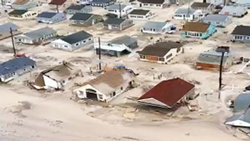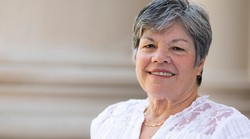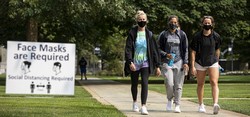The University’s Counseling and Psychological Services Held a Support Session to Help Students
 Anticipating the anxiety of students and faculty after the destruction of super-storm Sandy, the University’s Counseling and Psychological Services held a support session to assist with the transition back to campus. The session, which was held in Anacon Hall on Tuesday Nov. 13, was led by Counseling and Psychological Services’ Director, Dr. Franca Mancini.
Anticipating the anxiety of students and faculty after the destruction of super-storm Sandy, the University’s Counseling and Psychological Services held a support session to assist with the transition back to campus. The session, which was held in Anacon Hall on Tuesday Nov. 13, was led by Counseling and Psychological Services’ Director, Dr. Franca Mancini.
Mancini said that the decision to hold the session was influenced by several students from the University’s Social Work Department. “After the suggestion from those students, we decided to offer a place where students and members of the University could come together and talk about their experiences and feelings after coming through the storm,” said Mancini.
Although the event had a light turn-out of eight people, the small group took advantage of the personal environment.
First, a deep-breathing exercise was conducted by Mancini which was used to repose and relax the attendees. Next, each person took turns detailing their experiences during and after the storm including how the damage from Hurricane Sandy personally effected them and their families. Because of confidentiality rights, the information that the attendees discussed cannot be shared outside of the session.
After all of the attendees shared, Mancini explained to the group that traumatic experiences such as Superstorm Sandy can negatively effect people in many different ways. “As a result of the devastating event, some people may begin to experience depression, an increase level of anxiety and even start to withdraw and isolate themselves,” said Mancini. “It’s important for one to recognize any individual symptoms and address them immediately.”
According to Tom McCarthy, Assistant Director of Counseling and Psychological Services, addressing some of those symptoms can be as simple as slowly getting back into a routine again. “For an individual who doesn’t quite feel like themselves, it is helpful for them to remember what kept them grounded before the storm occurred,” said McCarthy. “If the person enjoyed running, they should get back to running. If the person liked to play video games, then they should do that. If a certain activity worked for the individual before, chances are it will work for them again,” said McCarthy.
According to Dr. Jamie Goodwin, psychology instructor, there are several other ways for one effected by the storm to begin the healing process. “Asking for and accepting support from friends and family can be a helpful tool,” said Goodwin. “Many times simply talking about your feelings with a caring other is enough to make you feel stronger.” He also said another helpful tool that has been prevalent over the past month is service to other victims. “If possible, help other people – this improves the feelings of helplessness that contributes to post-disaster stress as well,” said Goodwin.
After the session, some of the students who attended the event were lingering outside of Anacon Hall, continuing their discussion. When asked if the session was helpful, one of those students responded, “Today was an intense day because, in all of my classes, we talked about the effects of the storm from different angles and perspectives. Tonight’s session helped a great deal though and I feel calmer and happier than I did this morning,” the social work major said.
For another student, whose chose to remain anonymous, the session was helpful for her as well. “This was an effective way to unload some of the grief and stress from within,” she said.
A month has passed since the historic storm has ravaged the area and as the saying goes, time heals all wounds. Professor Goodwin points out, for some people, this may not be the case. “If a person is still continuing to struggle or function emotionally, academically, and/or in their relationships after this period of time- then seeing a counselor is essential,” said Goodwin. “It is an important part of taking care of yourself, and reclaiming your pre-disaster life.”



